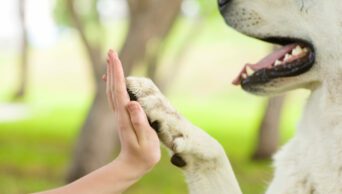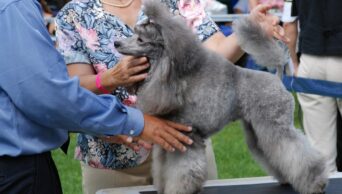Why your dog might be behaving out of character
Dog Health , +1
February 28, 2017

Like humans, dogs’ personalities and behaviour can change. This might be a natural development as they mature, but could also signify a sign of their discomfort. Here is a list of some of the reasons your dog might be behaving differently:
Communication
As they get older, dogs can become more vocal. This is usually attributed to growing confidence, but it could also be a sign of disorientation or distress. This could be due to a number of causes, including cognitive dysfunction, loss of hearing, arthritis, or injury. Pain and discomfort can manifest in other behavioural changes too, such as lethargy, irritation, aggression, or a loss of interest in the things they usually enjoy. If you notice a significant change in their communication skills, take a trip to the vets to rule out any physical causes — after all, it’s always better to err on the side of caution.
However, if a medical condition is not to blame, try training them to quiet upon your arrival, using treats to reward good behaviour. Alternatively, try a group training class to help them to socialise and be comfortable around other dogs and people.
In addition, it’s important to note that humans may also be an important factor, as even the most sociable of dogs don’t want to play all the time…
Make sure children are supervised around your dog, as they can often irritate them by pulling their tail or poking them, leading to out-of-character aggressive outbursts from your dog. Respect when you sense your dog might need some alone time, and leave them in a peaceful, quiet place to rest.
Tired and restless
Does your dog awaken during the night and feel restless or forgetful during the day? They might be experiencing hearing or vision loss, usually due to old age. Similarly, dogs can experience signs of dementia, as their brains go into a natural decline experienced by all animals as they grow old. As well as an increased loss of senses, dogs can become forgetful — getting lost on walks, or not recognising their family.
Whilst there is no cure for this, there are brain boosting exercises you can do with your dog to keep their mind stimulated. In addition, it might be worth ‘baby-proofing’ your home — making sure there are no sharp edges or harmful objects in reach, especially for those dogs experiencing a loss of sight or hearing.
Potty training
Has your dog been making a few ‘accidents’ around the house lately? Don’t be too quick to punish them… Many dogs naturally lose their bladder and bowel control as they age. Alternatively, it might be due to a decrease in mobility or a medical condition. As with any abnormality, it’s always best to get a second opinion from your vet to rule out any medical conditions.
If, however, there is no medical cause, try repeating house-training as if they were a puppy. Rewarding good behaviour and taking more potty trips outside might be enough to get to keep your house clean.
Anxiety
As your dog gets older, slower and more fragile, the world becomes an increasingly scary place for them, and they might experience feelings of anxiety. This may be due to a loss in hearing or vision, or may come about as a result of a changed routine, another dog close-by, or perhaps a new addition to your family. If you think your dog might be suffering from anxiety, it’s important to make them feel safe and calm — try paying them extra attention and ensure their living environment is quiet and relaxing.
Increased fear
Whilst anxiety is an ongoing and constant discomfort for your dog, they may experience fear solely in certain situations — this could be a particular place, person or even a sound. It’s important to try and work out why this may be — did they experience something negative? If you’re still perplexed, it’s best to avoid these trigger situations when you are with your dog.
Have you noticed any more behavioural changes in your dog? Or do you have any of your own tips to add? Pop them into our Facebook comments — we’d love to hear!


